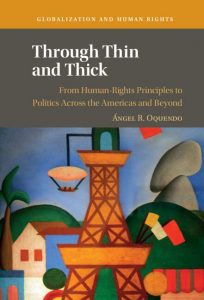Contributed by Ángel R. Oquendo
Through Thin and Thick: From Human-Rights Principles to Politics Across the Americas and Beyond (Cambridge University Press) (2022)
Hopefully, this note will move you, readers of La Voz, to a conversation with me and among yourselves. It will react against an anecdote about Spanish writer Francisco Umbral.
A television show had invited him upon the appearance in print of his chronicle about the socialist administration in Spain between 1982 and 1992.[1] After a long chitchat among other guests, he stood up shouting: “I came here to talk about my book.”[2]
In contrast, I have not arrived before you to chat about mine. Ideally, mine will just serve as a pretext for the alluded-to dialogue about our common intellectual interests.
Summary
The book launches from examples, concrete cases, or political confrontations, explaining how to conceive the safeguards at stake. It portrays these as embodying principles requiring particular actions together with the implementation of policies. For instance, free speech demands permitting seemingly offensive expression plus promoting a diverse and open public debate.
Then, the text scrutinizes specific guaranties, like those pertaining to asylum, citizenship, abortion, due process, self-determination, or the environment. It presents them as inducers of problems peculiar to them. Next, the discussion dissects how precepts—human rights and democracy at the forefront—may contingently clash despite their overall commensurability. Finally, it underscores the interconnection of negative, substantive, and national entitlements with positive, procedural, and international ones.
In truth, the table of contents reads like a cryptic poem. It breaks down into these parts: Conception, Concretion, Confliction, Connection. On afterthought, they might evoke those of a self-help manual.
Throughout, ruminations on these questions unfold: How may courts and governments respectively contribute to actualizing these liberties? Do these bear upon social justice? May ideologically opposed states nonetheless collaborate on them?
Aspirations to:
Reformulate the Relationship Between Principles and Policies Within These Freedoms
Explicate the Respective Roles of the Judiciary and Executive in Implementing These Protections
Reflect on the Bearing of These upon Social Justice
Ponder Ideologically Adverse Nations in Collaboration on Them
Hook
The publication explains how these freedoms can boil down to a matter of principle and yet call for implementation through policies.
Description
The book addresses anybody interested in human rights—a professor or student, an actor or analyst, or a concerned person—whether from a legal, philosophical, politically scientific, sociological, historical, journalistic, anthropological, or humanitarian perspective. She will appreciate the path provided to think and talk clearly about these guaranties.
Features/Benefits
Explores legal and philosophical issues touching upon these protections. Enables grappling with these two sets of topics and envisaging their interrelationship.
Shows how negative, substantive, and national entitlements interact with positive, procedural, and international ones. Allows assuming an integrative rather than a compartmentalized approach to these safeguards.
Demonstrates how political principles, those of democracy and human rights in particular, may contingently conflict. Assists in understanding how one may respond to these conflicts.
[1] Francisco Umbral, La década roja (1993).
[2] Julio Llamazares, Hablar de tu libro, El país, Nov. 28, 2020, at 12 (“¡Yo he venido a hablar de mi libro!”).
